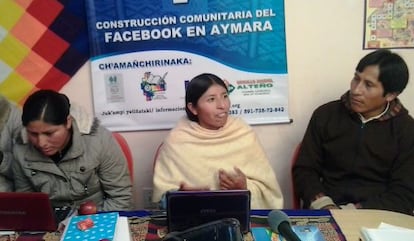Indigenous Bolivians translate Facebook into Aymara
A group of volunteers is working on launching the social networking site in their language

Instead of “Comment,” you will press “Qillqt’aña,” and instead of “Like,” you will click on “Kusawa.” A group of volunteers from El Alto, Bolivia has been working for more than a year on translating Facebook into Aymara, the second most widely spoken indigenous language in the South American country.
Jaqi Aru, an online community launched in 2009, promoted the initiative. Rubén Hilari, one of its members, says everything began with the desire to strengthen their language and culture. They also wanted to increase the amount of online content in Aymara, which Unesco has included in its Atlas of the World’s Languages in Danger. “We create individual and group blogs, sign up for social media, contribute to Wikipedia content in Aymara, subtitle videos,” Hilari says. “Aymara is alive. It does not need to be revitalized. It needs to be strengthened and that is exactly what we are doing.”
Aymara is alive. It does not need to be revitalized. It needs to be strengthened and that is exactly what we are doing” Rubén Hilari of Aymara online community Jaqi Aru
Elías Quispe, the manager of the platform, says they have translated the 24,000 words that Facebook requires in order to launch the social media service in a new language and that they are now reviewing the terminology.
Quispe says Facebook’s translation department told them they were very close to meeting the requirements two months ago. “That gives us a lot of strength to finish the job,” he adds. Between 15 to 20 volunteers have worked on the project. At first they met twice a week but now they only get together online.
Rubén Hilari says he is convinced that launching the Aymara version of Facebook will raise the self-esteem of many young people and strengthen their sense of cultural identity. “If we do not work for our language and culture today, it will be too late tomorrow to remember who we are and we will always feel insecure about our identity.”
English version by Dyane Jean François.
Tu suscripción se está usando en otro dispositivo
¿Quieres añadir otro usuario a tu suscripción?
Si continúas leyendo en este dispositivo, no se podrá leer en el otro.
FlechaTu suscripción se está usando en otro dispositivo y solo puedes acceder a EL PAÍS desde un dispositivo a la vez.
Si quieres compartir tu cuenta, cambia tu suscripción a la modalidad Premium, así podrás añadir otro usuario. Cada uno accederá con su propia cuenta de email, lo que os permitirá personalizar vuestra experiencia en EL PAÍS.
¿Tienes una suscripción de empresa? Accede aquí para contratar más cuentas.
En el caso de no saber quién está usando tu cuenta, te recomendamos cambiar tu contraseña aquí.
Si decides continuar compartiendo tu cuenta, este mensaje se mostrará en tu dispositivo y en el de la otra persona que está usando tu cuenta de forma indefinida, afectando a tu experiencia de lectura. Puedes consultar aquí los términos y condiciones de la suscripción digital.








































